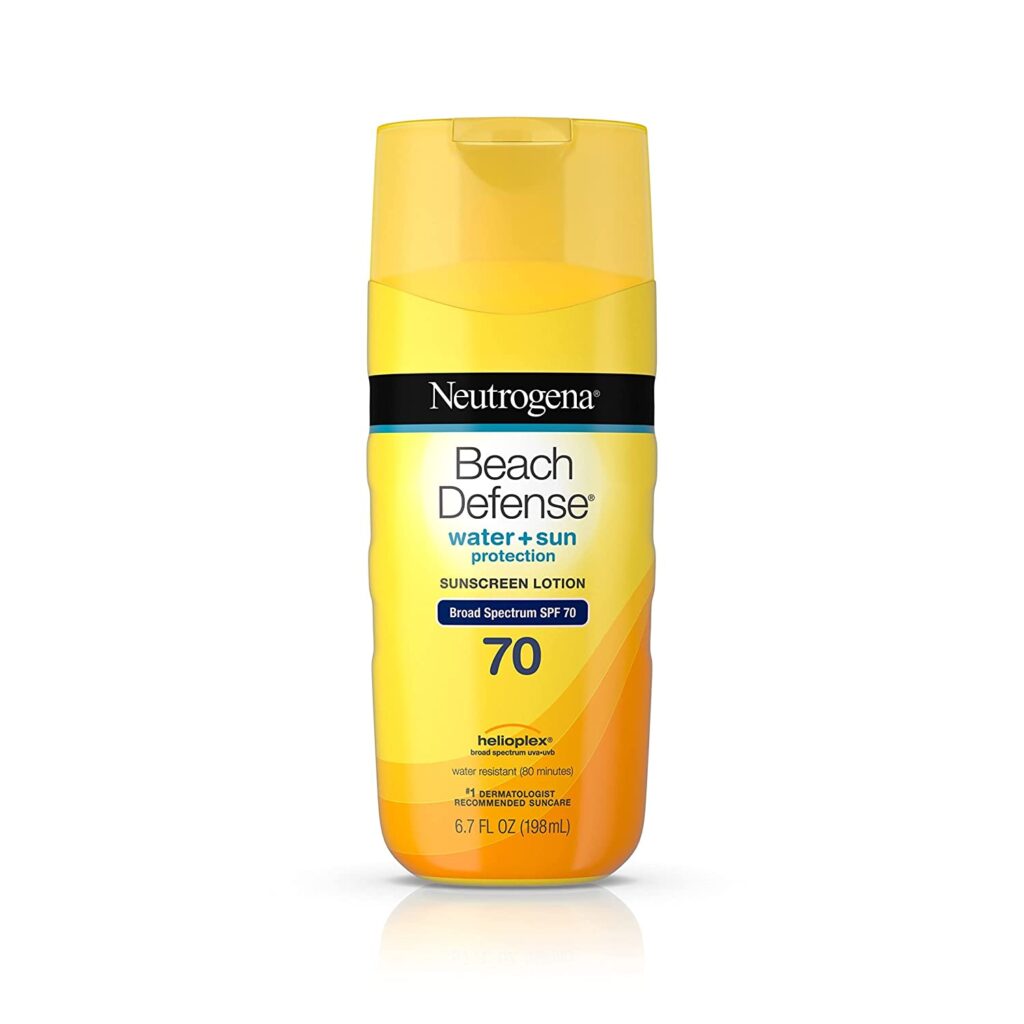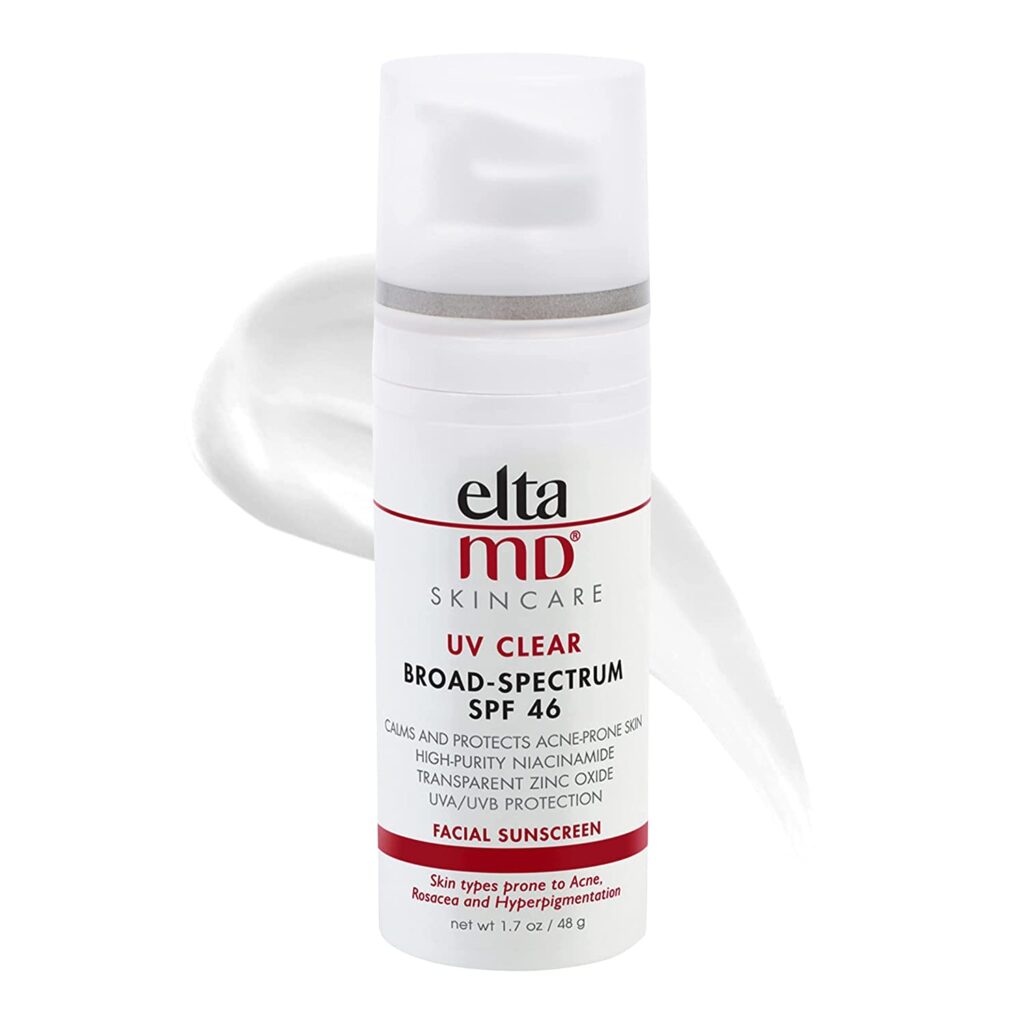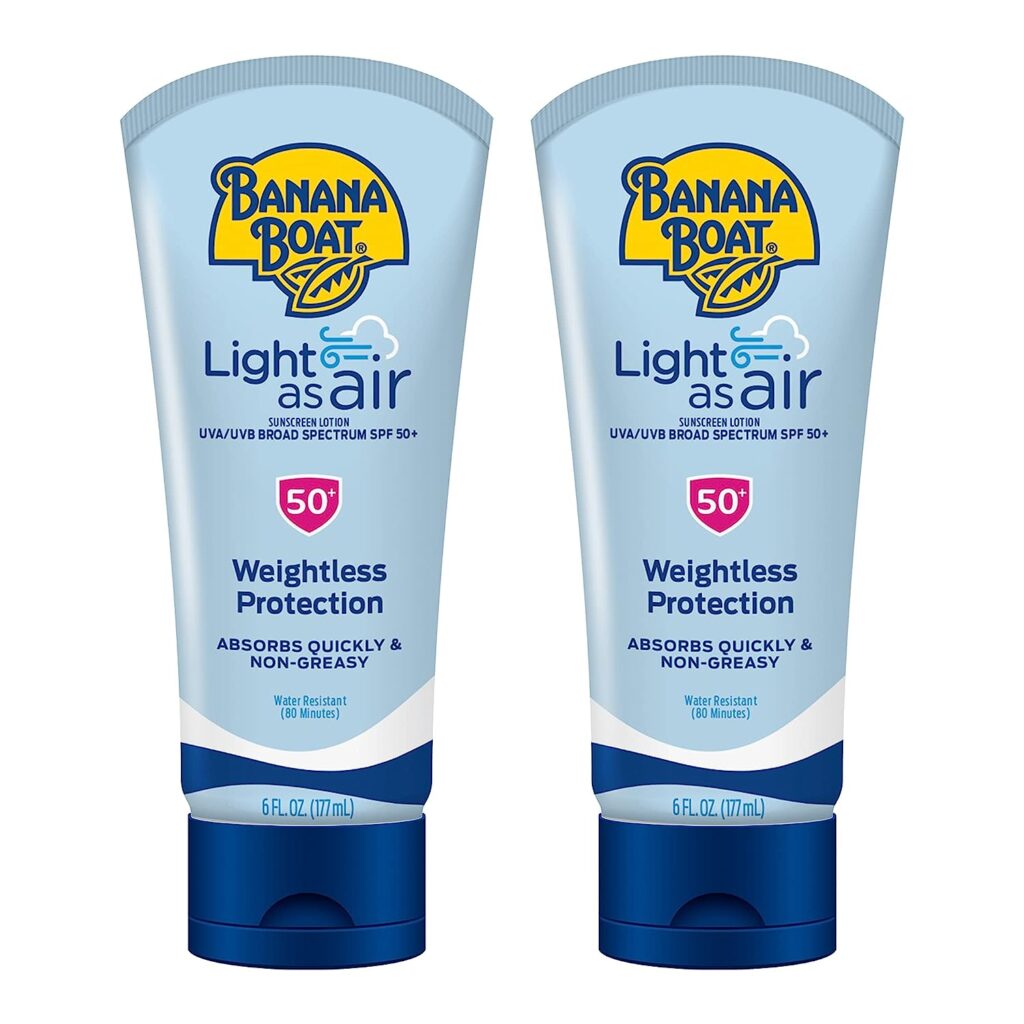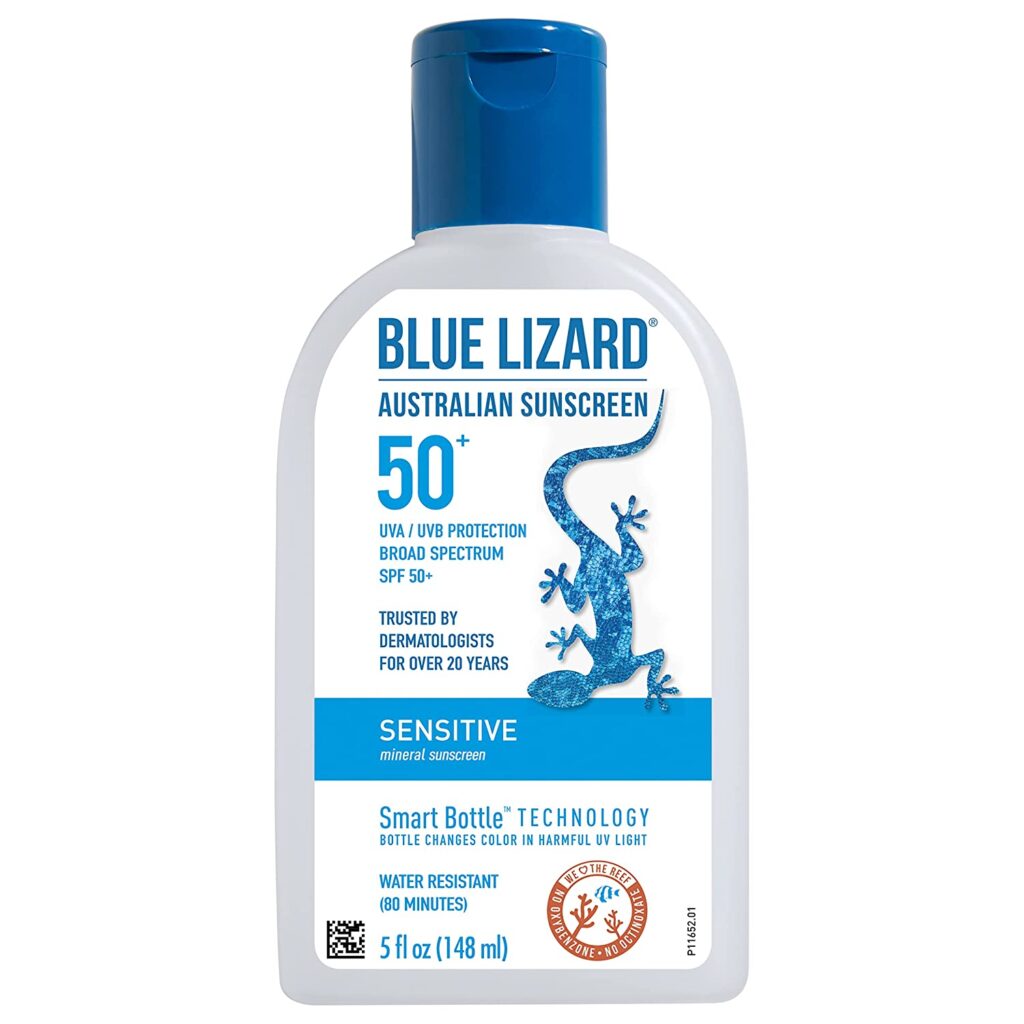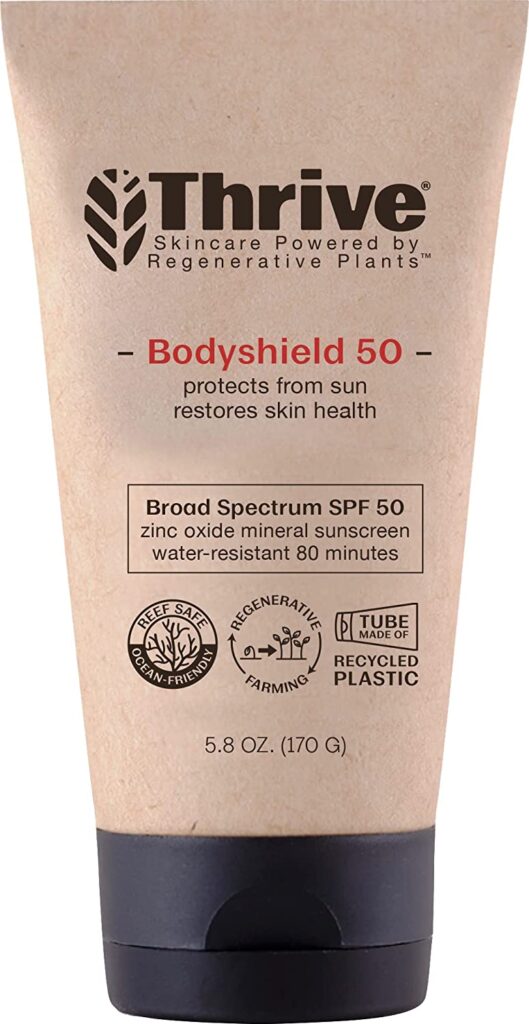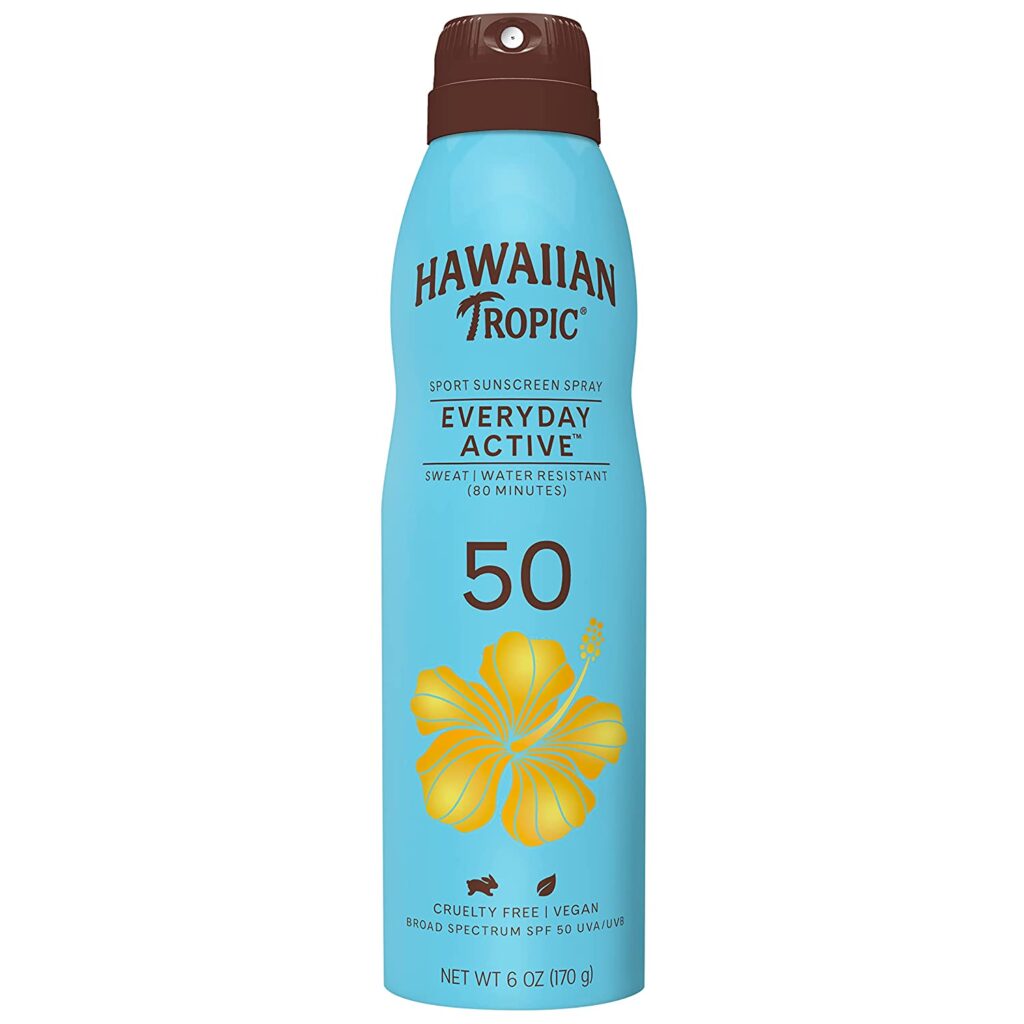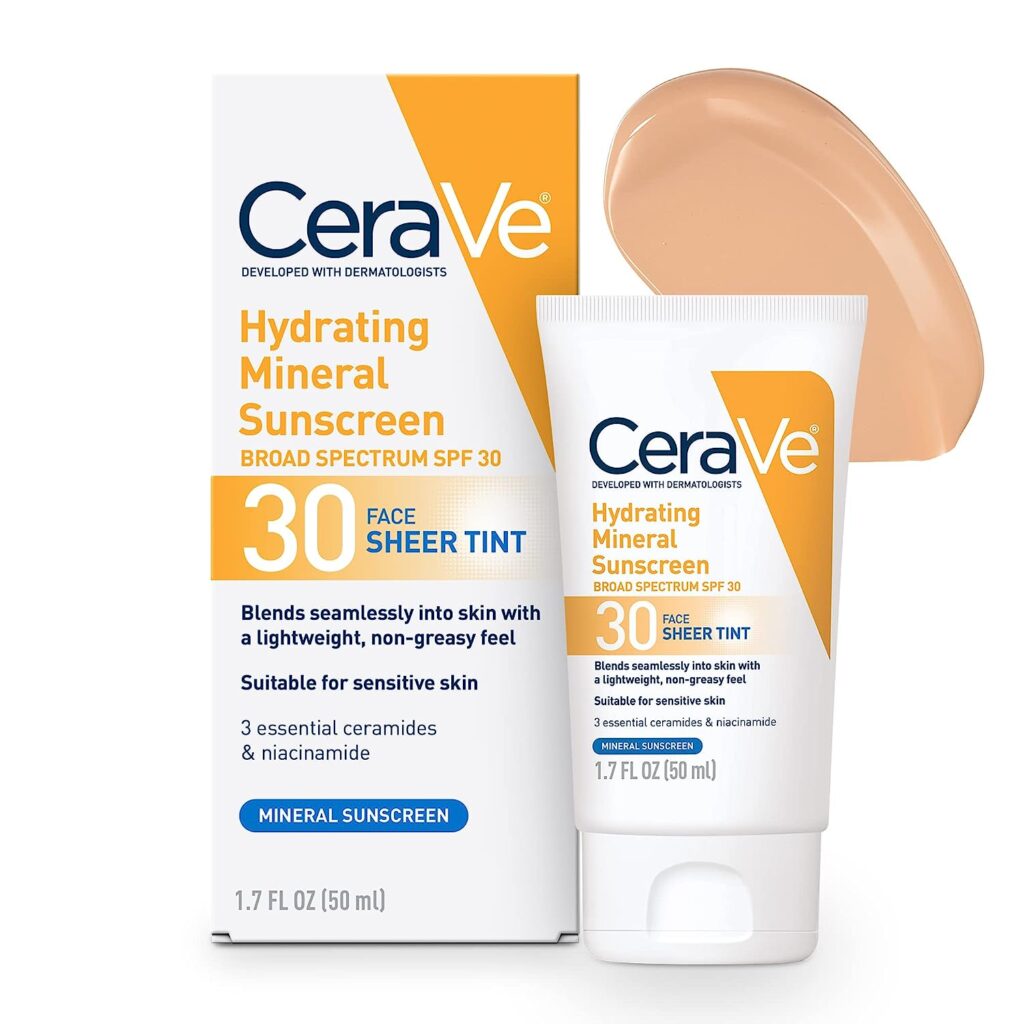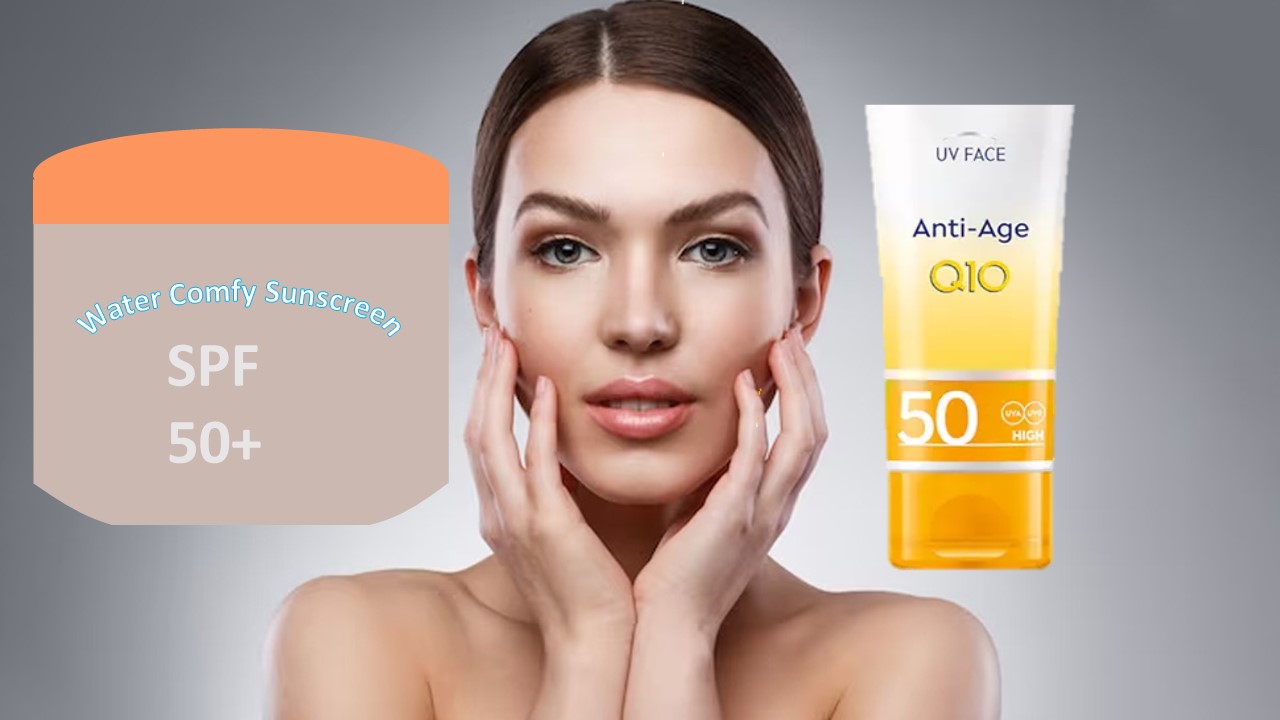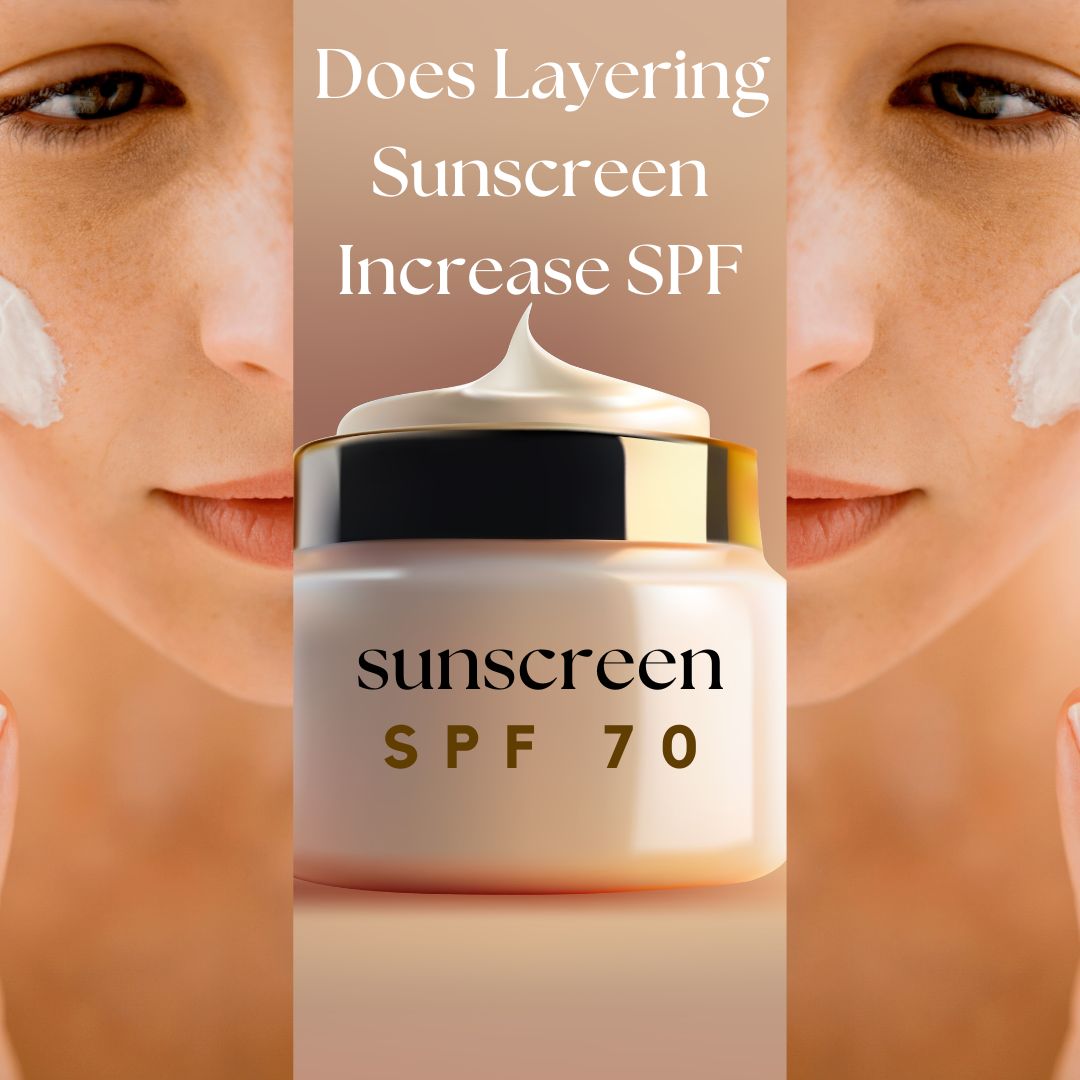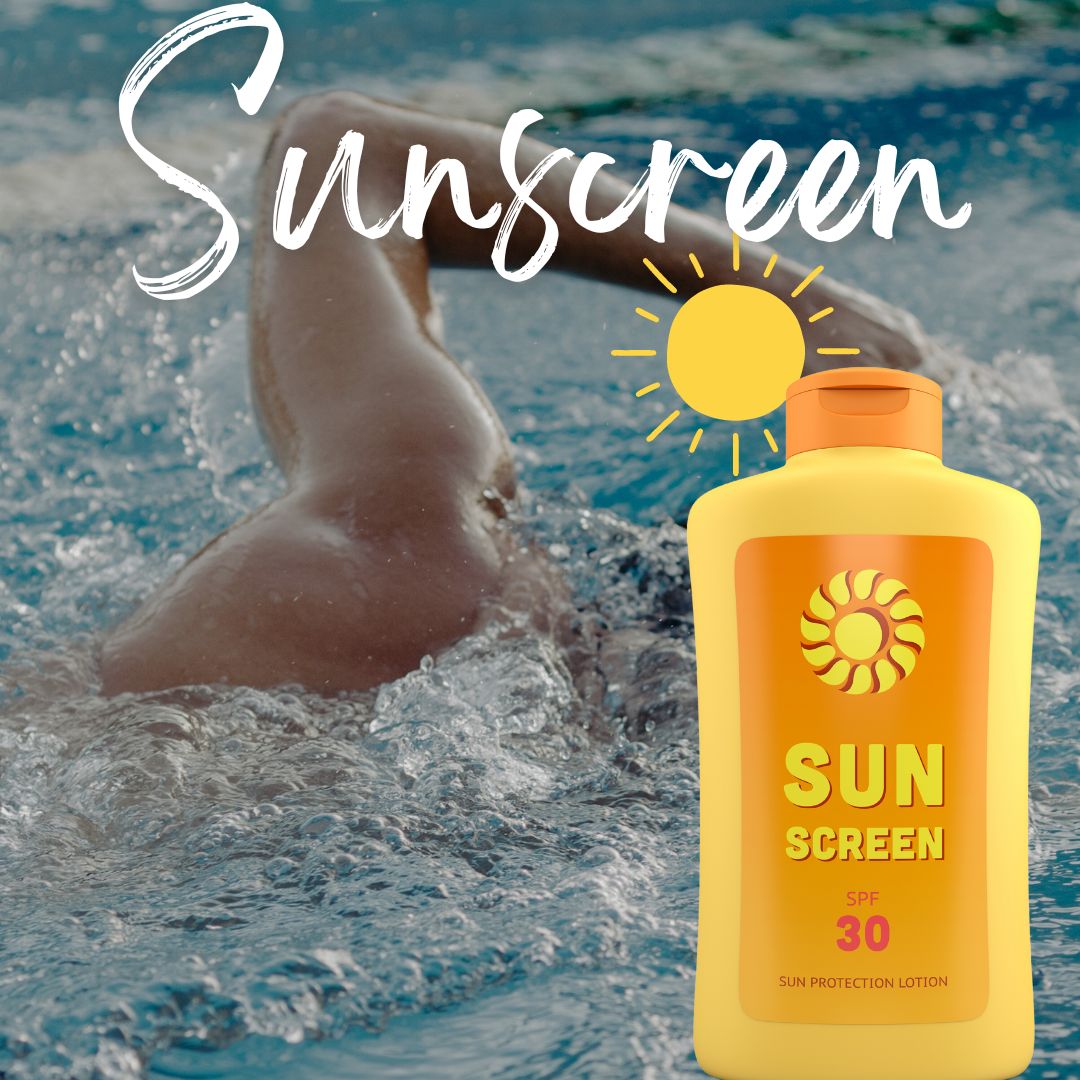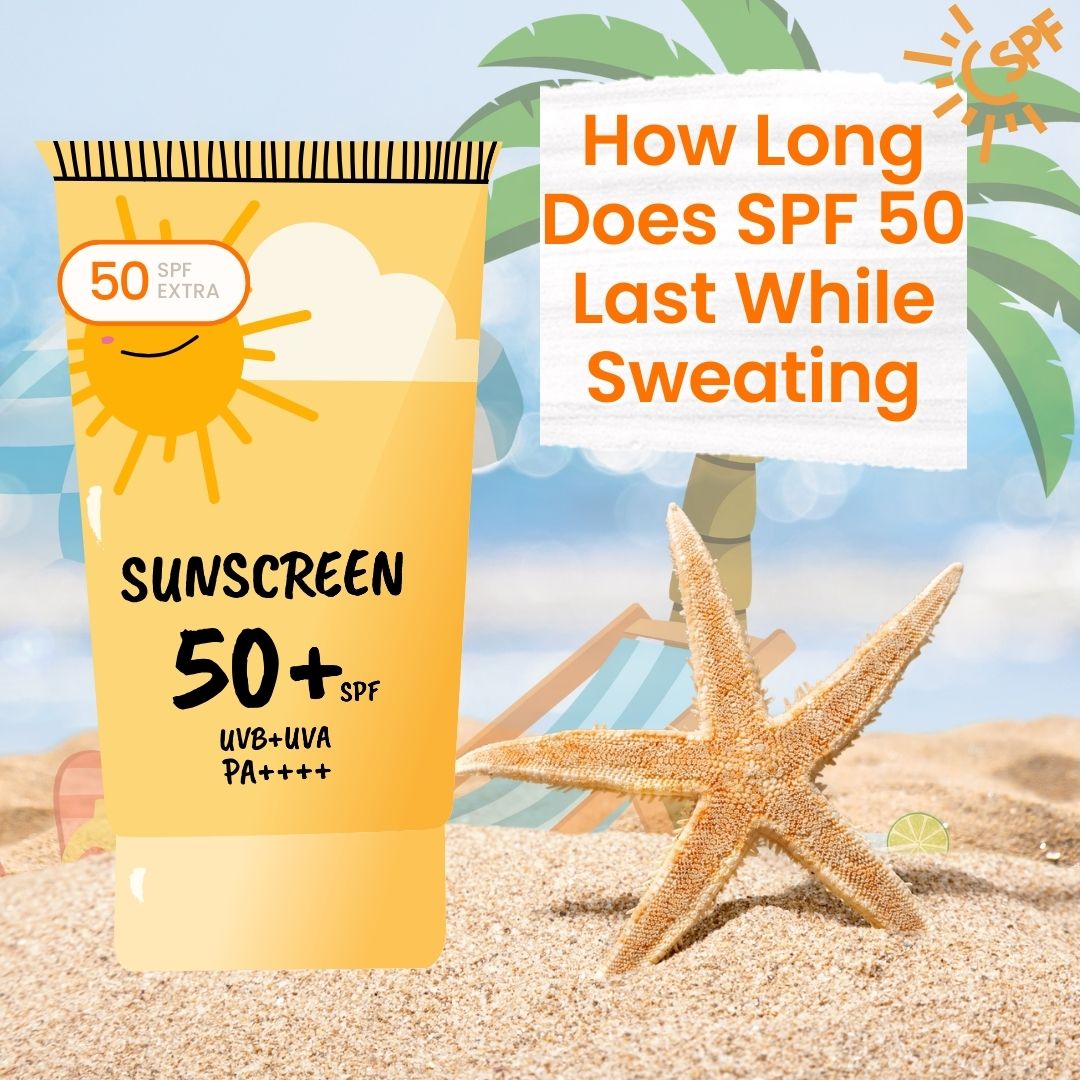What Is The Best Sunscreen For Beach – Top 10 Sunscreen Recommended By Experts
Looking for an answer to “what is the best sunscreen for beach?” According to the Skin Cancer Foundation, one in five Americans will develop skin cancer in their lifetime and over 2 people in the U.S. die of skin cancer every hour. With the best sunscreen, you can reduce your risk of developing skin cancer.
The beach can be a treacherous environment for your skin, with the sun’s powerful UV rays causing potential harm like sunburn, premature aging, and even skin cancer. We have discovered two exceptional sunscreens that provide top-notch protection against these hazards – Sun Bum Original SPF 50 Sunscreen Lotion and Neutrogena Beauty and the Beast Beach Defense Sunscreen.
In the following paragraphs, we will explore the key features, benefits, and user reviews of different sunscreens, along with essential tips for choosing the ideal sunscreen for your beach excursions. So whether you’re a sun worshipper or just want to protect your skin from the sun’s harmful rays, read.
What Is The Best Sunscreen For Beach
The sun is shining, the waves are crashing, and you’re ready to enjoy a day at the beach. But before you head out, it’s important to protect your skin from the sun’s harmful rays. Some of the sunscreens also offer moisturizing features you need to keep your skin moisturized.
Just as life jackets, water gloves, beach chairs, water bottles and water shoes are important for the beach, sunscreens are also vital.
Sunscreen is essential for beach days, but with so many different brands and formulas on the market, it can be tough to know which one is right for you.
If your question is “what is the best sunscreen for the beach,” here are the best sunscreens for the beach:
1. Sun Bum Original SPF 50 Sunscreen Lotion
Sun Bum Original SPF 50 Sunscreen Lotion is a water- and sun-protective lotion that helps prevent sunburn. It is ideal for active families and has a beach-strength formula with SPF 50. The lotion is non-greasy and contains HELIOPLEX Broad Spectrum UVA/UVB protection.
Top Features
Water- and sun-protective lotion
Excellent for active families
Beach-strength formula with SPF 50
HELIOPLEX Broad Spectrum UVA/UVB protection
Lightweight and Non-greasy
Pros
Effective at preventing sunburn.
Lightweight and non-greasy.
Water-resistant.
Long-lasting.
Fragrance-free.
Oxybenzone, Octinoxate, Gluten, Cruelty and Paraben Free.
Cons
You have to apply it every 2 hours for maximum protection.
2. Neutrogena Beauty and the Beast Beach Defense Sunscreen
Neutrogena Beauty and the Beast Beach Defense Sunscreen is a highly recommended choice when it comes to selecting the best sunscreen for the beach.
This exceptional product offers a range of features to ensure your skin remains protected during your beach adventures. Here are the top five features of Neutrogena Beauty and the Beast Beach Defense Sunscreen:
Features
Water and Sun Protection
Perfect for Active Families
Beach-Strength Formula with SPF 70
HELIOPLEX Broad Spectrum UVA/UVB Protection.
Non-Greasy
Pros
Provides effective water and sun protection, making it ideal for beach activities.
Offers a high SPF 70 level for robust sun protection.
Utilizes HELIOPLEX technology to provide broad-spectrum UVA/UVB protection.
Specifically designed for active families and outdoor enthusiasts.
Non-greasy formula ensures a comfortable application experience.
Cons
You have to re-apply every 80 minutes for maximum protection.
3. Obagi Medical Sun Shield Tint Broad Spectrum SPF 50 Sunscreen
Obagi Medical Sun Shield Tint Broad Spectrum SPF 50 Sunscreen is a tinted sunscreen that provides protection against both UVA and UVB rays. It is hypoallergenic, sheer, and fragrance-free. It also has IR defense to help buffer the skin from heat-derived oxidative stress.
Features
Provides protection against both UVA and UVB rays.
Hypoallergenic, sheer, and fragrance free.
IR defense to help shield the skin from heat-derived oxidative stress.
Water resistant (80 minutes).
Non-comedogenic (will not clog pores)
Professional
Pros
Provides broad-spectrum protection.
Hypoallergenic and fragrance free.
IR defense.
Water and sun resistant.
Non-comedogenic.
Cons
Can be expensive.
Needs to be reapplied every 2 hours.
4. EltaMD UV Clear Face Sunscreen, SPF 46 Oil Free Sunscreen
Neutrogena Beauty and the Beast Beach Defense Sunscreen is a highly recommended choice when it comes to selecting the best sunscreen for the beach even if you have dry skin.
This exceptional product offers a range of features to ensure your skin remains protected during your beach adventures.
Features
Water and Sun Protection
Ideal for Active Families
Beach-Strength Formula with SPF 46
HELIOPLEX Broad Spectrum UVA/UVB Protection
Non-Greasy
Pros
Provides effective water and sun protection, making it ideal for beach activities.
Offers a high SPF 70 level for robust sun protection.
Utilizes HELIOPLEX technology to provide broad-spectrum UVA/UVB protection.
Specifically designed for active families and outdoor enthusiasts.
Non-greasy formula ensures a comfortable application experience.
Cons
Scent
May irritate eyes
5. Banana Boat Light As Air Sunscreen
Banana Boat Light As Air Sunscreen is a lightweight, non-greasy sunscreen that is perfect for the beach. It offers broad spectrum UVA/UVB protection and is water resistant for up to 80 minutes. It is also free of oxybenzone, octinoxate, parabens, and phthalates.
Features
Weightless, ultra-breathable formula
Non-greasy and fast absorbing
Broad spectrum UVA/UVB protection
Water resistant for up to 80 minutes
Free of oxybenzone, octinoxate, parabens, and phthalates
Pros
Lightweight and non-greasy
Fast absorbing
Broad spectrum protection
Water resistant
Reef friendly
Recommended by the Skin Cancer Foundation
Cons
Not reef safe.
6. BLUE LIZARD Sensitive Mineral Sunscreen
Blue Lizard Sensitive Mineral Sunscreen is a reef-safe, mineral sunscreen that is perfect for the beach. It offers broad spectrum UVA/UVB protection and is water resistant for up to 80 minutes. It is also free of oxybenzone, octinoxate, parabens, and fragrance.
Features
Reef-safe
Mineral sunscreen
Broad spectrum UVA/UVB protection
Water resistant for up to 80 minutes
Paraben-free and fragrance-free
Pros
Reef-safe
Mineral sunscreen
Broad spectrum protection
Water resistant
Non greasy
Paraben-free and fragrance-free
Ideal for sensitive skin
Cons
Temperatures can affect how well it rubs.
7. Thrive Natural Body Mineral Sunscreen
Thrive Natural Body Mineral Sunscreen is a reef-safe, natural sunscreen that is great for the beach. It offers broad spectrum UVA/UVB protection and is water resistant for up to 80 minutes. It is also free of octinoxate, oxybenzone, fragrances, parabens and artificial colors.
Features
Reef-safe
Natural sunscreen
Broad spectrum UVA/UVB protection
Water resistant for up to 80 minutes
Free of oxybenzone, octinoxate, parabens, fragrances, and artificial colors
Pros
- Reef-safe
- Natural sunscreen
- Non greasy
- Broad spectrum protection
- Water resistant
- Free of harmful chemicals
- Body repairing
- 100% satisfaction guarantee
Cons
May not be perfect for sensitive skin
8. Hawaiian Tropic Everyday Active Clear Spray Sunscreen SPF 50
Hawaiian Tropic Everyday Active Clear Spray Sunscreen SPF 50 is a highly recommended sunscreen specifically designed for beach use. This sunscreen offers a range of features that make it a top choice for sun protection. Here are the top features of Hawaiian Tropic Everyday Active Clear Spray Sunscreen:
Features
Breathable, Ultralight, High-Performance Formula with SPF 50
Goes on Clear providing invisible sun protection.
Continuous Clear Spray.
Dermatologist Tested, ensuring its safety and efficacy for sun protection.
Water and Sweat Resistant
Pros
Breathable and ultralight formula for comfortable wear.
Goes on clear for invisible sun protection.
Convenient continuous clear spray for easy and mess-free application.
Dermatologist tested, ensuring its safety and effectiveness.
Water and sweat resistant for up to 80 minutes.
Non greasy
Cons
Some individuals may prefer alternative sunscreen formats such as lotions or sticks.
May burn some sensitive skin if applied too much.
9. Sun Bum Premium Day Tripper Sunscreen
Sun Bum Premium Day Tripper Travel-Sized Sun Care Pack is a travel-sized set of sunscreen products from Sun Bum. It includes a 3oz tube of their Moisturizing Sunscreen Lotion with SPF 30, a 3oz tube of their Sunscreen Lip Balm with SPF 30, and a 3oz tube of their Cool Down Hydrating After Sun Lotion.
All three products are broad spectrum UVA/UVB protection and are free of parabens, PABA, gluten, and are vegan. They are also oil-free, won’t clog pores, and are anti-aging. The set is TSA size approved and cruelty free.
Features
Travel-sized set of 3 sunscreen products.
Broad spectrum UVA/UVB protection.
Reef safe.
Free of parabens, PABA, gluten, and it is vegan.
Oil-free, won’t clog pores, and are anti-aging.
TSA size approved and cruelty free.
Pros
Convenient travel-sized set.
All-natural ingredients.
Broad spectrum protection.
Won’t clog pores.
TSA size approved.
Cruelty free.
Cons
May not be perfect for all sensitive skin.
10. CeraVe Tinted Sunscreen with SPF 30
CeraVe Tinted Sunscreen with SPF 30 is a sheer tinted mineral sunscreen that offers broad-spectrum protection from UVA and UVB rays. It is lightweight and it leaves skin with a healthy glow.
The sunscreen is also formulated with Niacinamide and Hyaluronic Acid to help calm and hydrate the skin. It is suitable for all skin types, including dry, sensitive, oily, and acne-prone skin.
Features
Sheer tinted mineral sunscreen for all skin tones
Lightweight and non-greasy feel
Formulated with Niacinamide and Hyaluronic Acid
Suitable for all skin types
3 essential ceramides to help restore skin’s natural barrier
Pros
Provides broad-spectrum protection from UVA and UVB rays
Lightweight
Leaves skin with a healthy glow
Formulated with Niacinamide and Hyaluronic Acid
Suitable for all skin types, especially dry skin.
Cons
Greasy.
May not be perfect for sensitive skin.
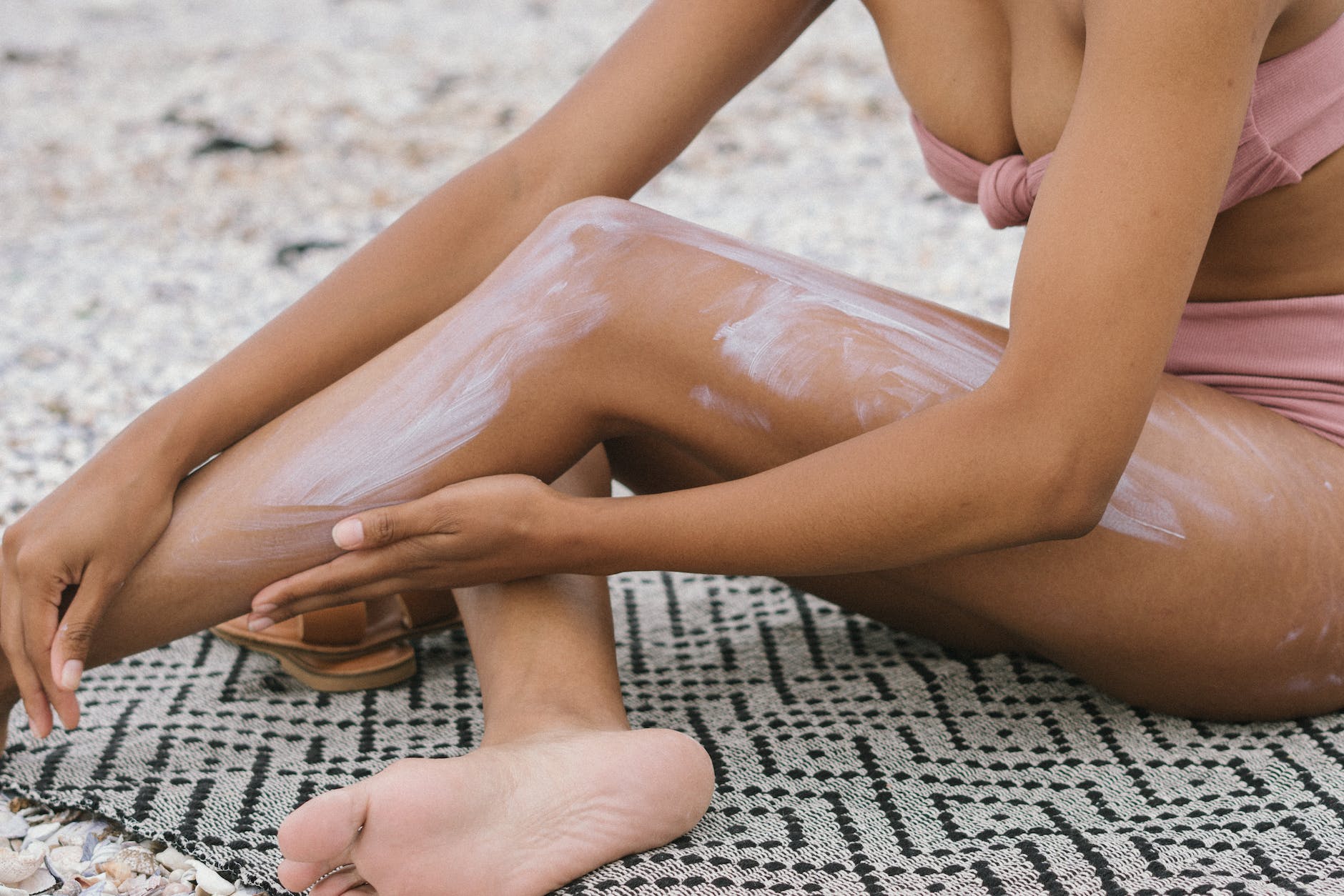
Benefits Of Sunscreen At The Beach (What Is The Best Sunscreen For Beach)
When it comes to enjoying a day at the beach, sunscreen should be at the top of your packing list. The importance of using sunscreen cannot be emphasized enough, especially when it comes to protecting your skin from the harmful effects of UV (ultraviolet) rays.
The beach environment, with its reflective sand and water, often intensifies UV exposure, making sunscreen an essential component of your beach routine.
UV rays, specifically UVA and UVB rays, can cause significant damage to the skin. Prolonged and unprotected exposure to these rays can lead to sunburns, premature aging, sunspots, and even an increased risk of skin cancer.
The beach, with its wide open spaces and direct sunlight, poses a higher risk of UV exposure compared to other settings. Therefore, applying sunscreen becomes crucial to safeguarding your skin’s health.
Here are the benefits of sunscreen:
- Sunscreen protects your skin from sunburn. Sunburn is a painful and uncomfortable condition that can cause redness, peeling, and even blistering. Sunscreen can help prevent sunburn by absorbing or reflecting UV rays before they can damage your skin.
- Sunscreen helps prevent skin cancer. Skin cancer is the most common type of cancer in the United States. UV rays from the sun are a major cause of skin cancer. Sunscreen can help reduce your risk of developing skin cancer by blocking UV rays from reaching your skin.
- Sunscreen helps prevent premature aging. UV rays from the sun can damage your skin’s collagen and elastin, which are the proteins that give your skin its strength and elasticity. Sunscreen can help prevent premature aging by protecting your skin from UV rays.
- Sunscreen helps keep your skin hydrated. The sun can dry out your skin, making it feel tight and uncomfortable. Sunscreen can help keep your skin hydrated by preventing it from losing moisture.
Sunscreen works by creating a protective barrier on the skin, blocking or absorbing the UV rays before they can penetrate and harm the skin cells. It acts as a shield, reducing the risk of sunburns and other sun-related skin issues.
By regularly applying sunscreen with a high SPF (Sun Protection Factor), you can significantly reduce the damaging effects of UV radiation.
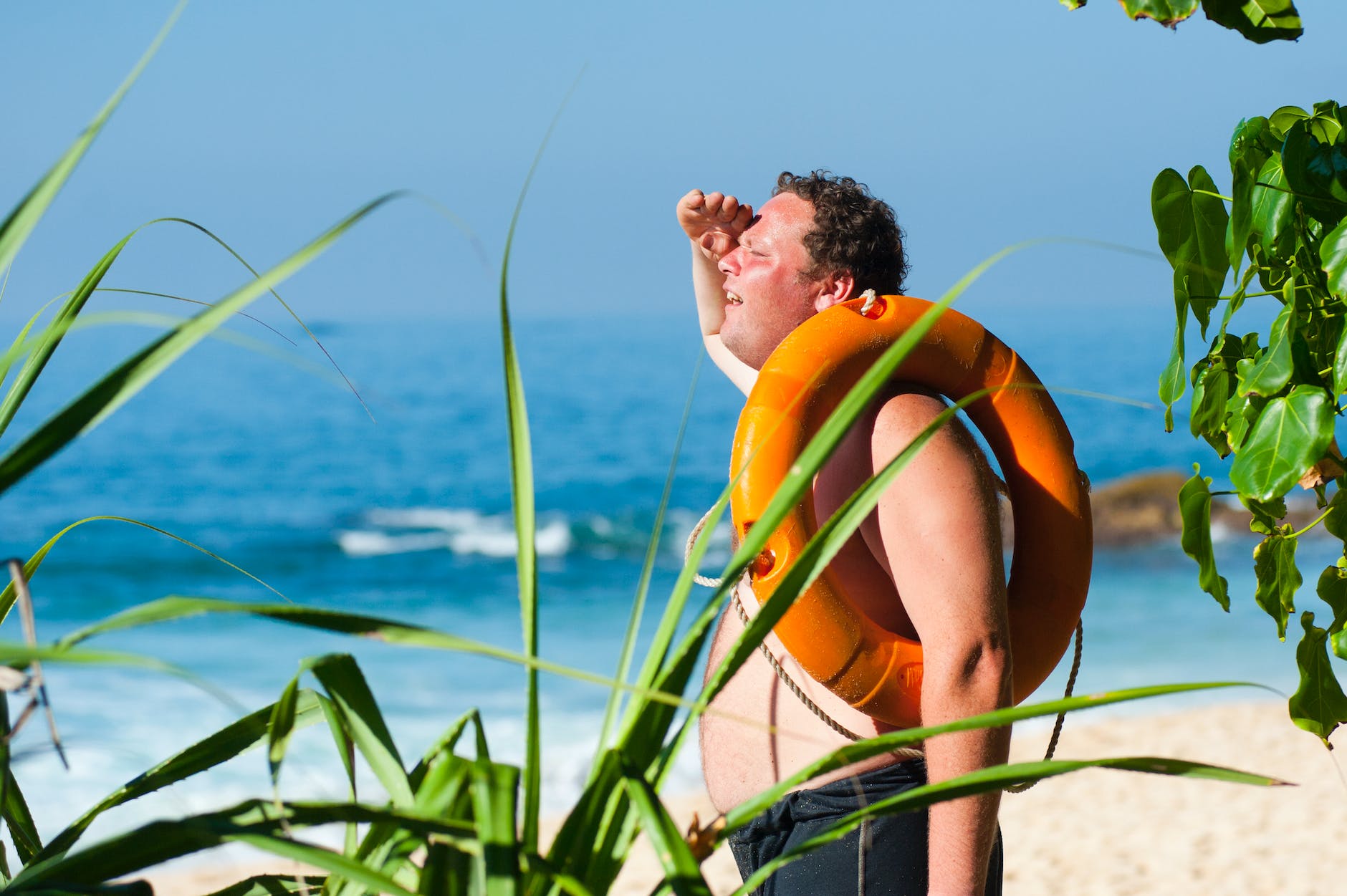
RELATED: Can Sunscreen Prevent Tanning
Understanding Sunscreen Ingredients (What Is The Best Sunscreen For Beach)
Understanding the key ingredients in sunscreen is essential for making informed choices about sun protection. Here are some important sunscreen ingredients and their functions:
1. Zinc Oxide
Zinc oxide is a mineral ingredient commonly found in physical sunscreens. It forms a protective barrier on the skin’s surface and reflects both UVA and UVB rays. Zinc oxide is known for its broad-spectrum protection and is generally well-tolerated by all skin types, including sensitive skin.
2. Titanium Dioxide
Similar to zinc oxide, titanium dioxide is a mineral ingredient that provides physical sun protection. It reflects and scatters UV rays, offering broad-spectrum coverage. Titanium dioxide is often used in combination with zinc oxide to enhance the effectiveness of sunscreens.
3. Avobenzone
Avobenzone is a chemical ingredient commonly found in sunscreens that absorbs UVA rays. It helps prevent sunburns and provides broad-spectrum protection. To ensure stability, avobenzone is often combined with other ingredients, such as octocrylene or Mexoryl SX.
4. Octinoxate
Octinoxate is a chemical ingredient that primarily absorbs UVB rays. It helps protect against sunburn and is often used in combination with other sunscreen ingredients to achieve broad-spectrum coverage.
5. Oxybenzone
Oxybenzone is a chemical ingredient that absorbs both UVA and UVB rays. It is effective at protecting against sunburns but has raised concerns about its impact on coral reefs. For eco-friendly purposes, it is advisable to choose oxybenzone-free sunscreens.
6. Mexoryl SX
Mexoryl SX (ecamsule) is a chemical ingredient that provides effective UVA protection. It is often used in combination with other sunscreen filters to enhance broad-spectrum coverage. Mexoryl SX is photostable, meaning it maintains its effectiveness even when exposed to sunlight.
7. Octocrylene
Octocrylene is a chemical ingredient commonly used in sunscreens to enhance stability and provide UVB protection. It is often combined with other sunscreen filters to achieve broad-spectrum coverage.
Understanding these sunscreen ingredients can help you select the right sunscreen for your needs. Consider your skin type, sensitivity, and preferences when choosing between physical or chemical sunscreens.
Remember to check the sunscreen’s label for its SPF (Sun Protection Factor) and whether it offers broad-spectrum protection to ensure comprehensive sun protection.
RELATED: Can Sunscreen Expire? – Uncovering The Surprising Truth
The Most Important Features To Look For In A Sunscreen (What Is The Best Sunscreen For Beach)
When selecting a sunscreen, there are several important features to consider to ensure effective sun protection. Here are the most crucial features to look for:
1. Broad-Spectrum Protection
Opt for a sunscreen that offers broad-spectrum protection, which means it shields against both UVA and UVB rays. UVA rays penetrate deeper into the skin and contribute to premature aging, while UVB rays primarily cause sunburn. Both types of rays can lead to skin damage and increase the risk of skin cancer.
2. Sun Protection Factor (SPF)
Check the sunscreen’s SPF rating, which indicates its ability to protect against UVB rays. SPF measures the time it takes for UVB rays to cause sunburn compared to unprotected skin.
Higher SPF values provide greater protection. It is generally recommended to choose a sunscreen with SPF 30 or higher for adequate protection.
3. Water Resistance
If you plan to engage in water activities or perspire heavily, opt for a water-resistant sunscreen. Water-resistant formulations adhere better to the skin when exposed to water, making them more effective during swimming or excessive sweating.
However, remember that water resistance is not permanent, and reapplication is necessary after towel drying or extended water exposure.
4. Skin Compatibility
Consider your skin type and any specific sensitivities when selecting a sunscreen. Look for products labeled as suitable for your skin type, such as sensitive skin or oily/acne-prone skin. Fragrance-free or hypoallergenic options can be beneficial for those with sensitivities or allergies.
5. Ease of Application
Choose a sunscreen that is easy to apply and suits your preference. Whether it’s a lotion, cream, gel, spray, or stick, find a texture and formulation that you find comfortable to use.
Some individuals may prefer lotions or creams for better coverage, while others may find sprays or sticks more convenient for application in hard-to-reach areas.
Note: Applying an adequate amount of sunscreen is essential for proper protection. For the average adult, it is recommended to use about one ounce (approximately a shot glass full) to cover the exposed areas of the body.
Don’t forget to reapply sunscreen every two hours or more frequently if you are sweating or in water.
How To Apply Sunscreen Effectively (What Is The Best Sunscreen For Beach)
Applying sunscreen effectively is crucial to ensure proper sun protection. Follow these steps for effective sunscreen application:
1. Choose the right sunscreen: Select a broad-spectrum sunscreen with a minimum SPF of 30.
2. Apply before sun exposure: Apply sunscreen at least 15 minutes before going outside to allow it to fully absorb into your skin.
3. Use an adequate amount: Apply a generous amount of sunscreen to cover all exposed areas of your body. In fact, layering sunscreen can help you to cover all the areas you should cover easily. Don’t forget often overlooked areas like ears, back of the neck, and tops of feet.
4. Reapply regularly: Reapply sunscreen every two hours, or more frequently if you are sweating or in water. Even water-resistant sunscreens lose their effectiveness over time.
5. Don’t forget your lips: Apply a lip balm with SPF to protect your lips from sunburn.
6. Follow proper technique: Apply sunscreen in a gentle, circular motion to ensure even coverage. Pay attention to any areas prone to sunburn, such as the face, shoulders, and back.
7. Consider additional protection: Sunscreen should be one part of your sun protection routine. Wear protective clothing, seek shade during peak sun hours, and wear sunglasses and a wide-brimmed hat for added protection.
Environmental Considerations When Buying A Sunscreen (What Is The Best Sunscreen For Beach)
With the growing awareness of environmental issues, it’s crucial to consider the impact of sunscreen chemicals on coral reefs. Certain chemicals commonly found in sunscreens, such as oxybenzone and octinoxate, have been shown to contribute to coral bleaching and harm marine ecosystems.
To protect our oceans while enjoying the beach, it’s important to choose reef-safe sunscreen options.
Reef-safe sunscreens are formulated without the harmful chemicals known to cause coral reef damage. Instead, they use alternative ingredients that are biodegradable and less harmful to marine life.
Look for sunscreens labeled “reef-safe,” “ocean-friendly,” or “coral-safe” to ensure you’re making an environmentally conscious choice.
Some common reef-safe sunscreen ingredients include zinc oxide and titanium dioxide, which are mineral-based and provide effective UV protection without the environmental risks. These mineral sunscreens work by reflecting and scattering UV rays away from the skin rather than absorbing them.
When selecting a reef-safe sunscreen, check the ingredient list to ensure it doesn’t contain oxybenzone, octinoxate, or other chemicals known to be harmful to coral reefs. Additionally, look for sunscreens that are labeled as “biodegradable” or “non-toxic” to further minimize their impact on the environment.
It’s important to note that even with reef-safe sunscreens, it’s still essential to follow responsible sunscreen practices. Avoid excessive use or unnecessary over-application, as any product entering the water can have some impact.
When applying sunscreen, do so before entering the water and allow it ample time to absorb into your skin.
RELATED: Can You Tan With Sunscreen SPF 50
Sun Protection Tips Beyond Sunscreen Usage (What Is The Best Sunscreen For Beach)
When it comes to sun protection, sunscreen is just one piece of the puzzle. To ensure comprehensive protection from harmful UV (ultraviolet) rays, it’s important to follow these additional sun protection tips:
1. Wear Protective Clothing: Covering up with clothing provides an extra layer of defense against the sun’s rays. Opt for lightweight, tightly woven fabrics that cover your arms, legs, and torso.
Don’t forget a wide-brimmed hat to shield your face, neck, and ears, and consider wearing UV-protective sunglasses to safeguard your eyes from UV damage.
2. Seek Shade: When the sun is at its peak, typically between 10 a.m. and 4 p.m., seek shade whenever possible. Shade offers natural protection by reducing direct exposure to UV rays. If shade isn’t readily available, create your own by using an umbrella, canopy, or sunshade.
3. Plan Outdoor Activities Wisely: Schedule outdoor activities in the early morning or late afternoon when the sun’s intensity is lower. This can minimize your exposure to the strongest UV rays and help prevent sunburn and overheating.
4. Stay Hydrated: Keep your body hydrated by drinking plenty of water, especially when spending time in the sun. Proper hydration helps regulate body temperature and supports overall skin health.
5. Be Mindful of Reflective Surfaces: Remember that surfaces like sand, water, and snow can reflect UV rays and increase your exposure. Take extra precautions in these environments by applying sunscreen more frequently, wearing protective clothing, and utilizing shade.
6. Check Medications: Some medications, including certain antibiotics and acne treatments, can increase your skin’s sensitivity to the sun. Consult with your healthcare provider or pharmacist to understand if any of your medications require additional sun protection measures.
7. Perform Regular Skin Checks: Keep an eye on your skin for any changes or abnormalities, such as new moles, growths, or spots. Early detection of skin changes can be crucial in identifying potential skin issues.
Remember, sun protection should be a year-round practice, not just limited to beach days. Incorporate these tips into your daily routine to ensure long-term skin health and reduce the risk of sunburns, premature aging, and skin cancer.

Tips For Choosing The Right SPF Level In A Sunscreen
Choosing the right SPF (Sun Protection Factor) level in sunscreen is essential for effective sun protection.
SPF indicates the level of protection a sunscreen provides against UVB (Ultraviolet B) rays, which are primarily responsible for sunburns. Understanding the different SPF levels and their corresponding levels of protection will help you make an informed decision.
SPF levels typically range from 15 to 50+, with higher numbers indicating higher levels of protection. Here’s a general breakdown of SPF levels and their associated protection:
1. SPF 15: Offers moderate protection by filtering out approximately 93% of UVB rays. Suitable for everyday activities with minimal sun exposure, such as running errands or commuting.
2. SPF 30: Provides high protection by blocking around 97% of UVB rays. Recommended for extended outdoor activitiesand for individuals with fair to medium skin tones.
3. SPF 50: Provides very high protection by blocking approximately 98% of UVB rays. Ideal for prolonged sun exposure, intense outdoor activities, and for those with fair or sensitive skin.
It’s important to note that no sunscreen can offer 100% protection. The increase in SPF level does not provide a proportional increase in protection. For instance, SPF 30 does not offer twice the protection of SPF 15. However, higher SPF levels can provide a slight increase in protection against UVB rays.
When selecting an appropriate SPF level, consider the following factors:
1. Skin Type: Individuals with fair or sensitive skin are more susceptible to sunburns and may require higher SPF levels for adequate protection. Conversely, individuals with darker skin tones may still benefit from lower SPF levels, but personal preferences and risk factors should also be considered.
2. Time of Sun Exposure: If you plan to spend extended periods in direct sunlight, such as at the beach or during outdoor activities, a higher SPF level is recommended to provide longer-lasting protection.
3. Personal Preferences: Some individuals may prefer the peace of mind that comes with a higher SPF, while others may find lower SPF levels sufficient for their needs. Personal preferences and comfort should be considered.
Ultimately, the best approach is to select a sunscreen with a minimum SPF of 30 and adjust accordingly based on your specific circumstances. Additionally, regardless of the chosen SPF level, remember to apply sunscreen generously and reapply it every two hours or more frequently if sweating or swimming.
The Bottom Line On What Is The Best Sunscreen For Beach
So, what is the best sunscreen for beach? When it comes to enjoying the beach while keeping your skin safe, it’s crucial to choose the best sunscreen for the beach.
By considering key factors such as broad-spectrum protection, a suitable SPF level, water resistance, compatibility with your skin type, and ease of application, you can make an informed decision. Remember, the best sunscreen is one that provides effective sun protection, feels comfortable on your skin, and aligns with your individual needs and preferences.
So, before you head to the beach, take the time to find the perfect sunscreen that will shield you from harmful UV rays and allow you to bask in the sun’s warmth with confidence.

